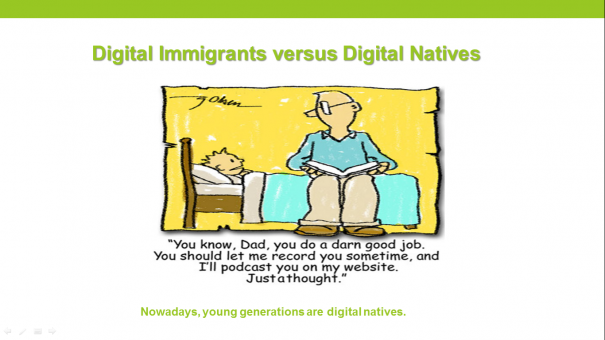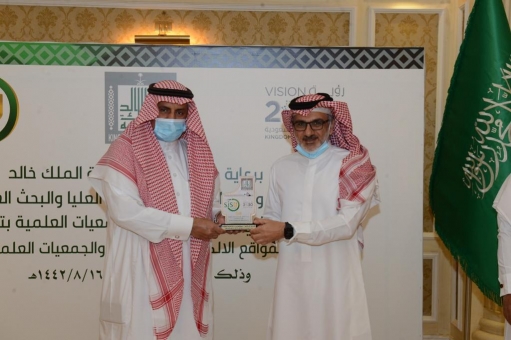The Scientific Research Committee - Women's section - organized a webinar entitled "Empowering Researchers & EFL Learners Through Digital Literacy" on March 31, 2021. The webinar was presented by Dr. Amal Metwally, the head of the scientific research committee, who indicated that the webinar is designed to explore the vital role of digital tools in empowering researchers and EFL learners.
Dr. Amal Metwally started her presentation with an introduction in which she differentiated between "digital natives" and "digital immigrants". Our students today are all "native speakers" of the digital language of computers and the Internet. Those of us who were not born into the digital world but have adopted aspects of the new technology are compared to them as "digital immigrants", she illustrated.
Dr. Amal Metwally asserted that digital natives may not be familiar with digital educational tools. For this reason, they need to be made aware of and taught about these educational tools since they are able to adopt new technologies into their learning quite easily.
"When teaching with digital tools and apps, you need to spend some time deciding which tools to use and how to use those tools to create autonomous, collaborative, innovative, authentic, and student-centered learning experiences", said Dr. Metwally.
"Digital Literacy" is often used as a synonym for digital or technical skills and competencies. However, comprehension of digital literacy should go beyond mere information technology skills, explained Dr. Metwally. She referred to two main types of definitions of digital literacy; conceptual definitions and standardized sets of operations intended to provide national and international normalizations of digital literacy.
Dr. Metwally referred to the definition by Richard Lanham (1995), who claims that "literacy" has extended its semantic reach from meaning "the ability to read and write" to now meaning "the ability to understand information however presented".
She also illustrated that in his book Digital Literacy (1997), Gilster identifies four key digital literacy competencies. These are: knowledge assembly, evaluating information content, searching the Internet, and navigating hypertext. Finally, she said that DL could be better defined as "The ability to use technology as a tool to research, organize, evaluate, and communicate information, and the possession of a fundamental understanding of the ethical/legal issues surrounding the access and use of information".
Dr. Metwally has also investigated the four digital literacy types: language-based, information-based, connection-based, and (re-) design-based literacies. She also indicated that digital literacy comprises five major digital skills. These are photo-visual, reproduction, branching, information, and socio-emotional skills.
In the following section of the webinar, Dr. Amal Metwally introduced some significant technology integration frameworks. The importance of exploring technology integration models is that such models are used by educators to evaluate and inform how they teach with digital tools and apps.
"Our goal, as educators, is to teach students, not just by transferring knowledge to them, but by creating meaningful learning experiences that support their knowledge, understanding and skill development", she said. SAMR model (2011), which stands for Substitution, Augmentation, Modification, and Redefinition, can be used as a guide for evaluating and selecting digital tools that will create meaningful teaching and learning experiences. Another model is the TPACK Framework (2006) which focuses on technological knowledge, pedagogical knowledge, and content knowledge, offers a productive approach to many of the dilemmas that teachers face in implementing educational technology in their classrooms. By differentiating among these three types of knowledge, the TPACK framework outlines how content and pedagogy must form the foundation for any effective educational technology integration. In exploring the role of digital literacy in empowering learners, Bloom's taxonomy can serve as a tool to help us select the most appropriate apps and tools based on the level and depth of cognitive knowledge students need to acquire. As we design instruction, we can consider how we might start with the higher-order thinking skills to encourage students to build their knowledge through learning experiences, explained Dr. Metwally.
She then answered the significant question, "How can digital literacy empower researchers & EFL learners?" She also reviewed some very helpful tools that can support researchers and EFL learners in their journey.
The webinar, which was very informative and highly engaging, was attended by the Dean's Assistant, Dr. Salma Alqahtani, staff members, MA & Ph.D. students, as well as some undergraduate students who showed their interest in digital tools. It is worth mentioning that the webinar was the last event organized by the scientific research committee in the second semester of this academic year 2020-2021.
Date: 4/4/2021
Source: Saeeda Alfaifi, member of the Scientific Research Committee


